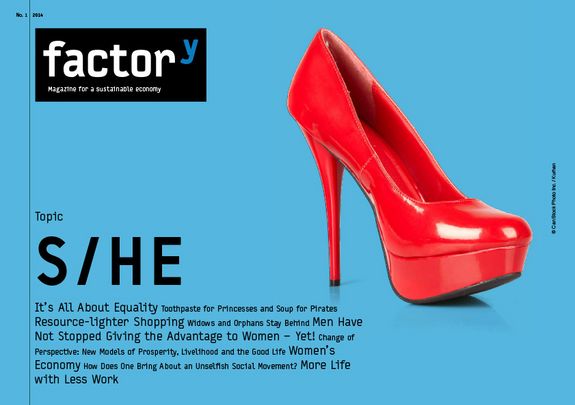Gender

Real sustainability is always connected to gender equality. The energy transition and the transformation to a sustainable society would be more advanced if the gender perspective were taken into more consideration, says Ulrike Röhr, a gender and sustainability expert, in an interview with Ralf Bindel.
Translated from the German by Dorothea Schwarz
Is gender equality a key element of sustainable economic activity or rather of a sustainable social strategy? Is it a condition of sustainable development?
Both are required. The problem, though, is that only a small percentage of people dealing with sustainability hold the same view. There is no common understanding of sustainability. Therefore, it is important to point out again and again that sustainability is about the different aspects of justice and gender equality plays an essential role in this respect. After the UN conference in Rio, when the term was booming, the understanding of sustainability was much broader than it is today. It seems to me that ever since then, it has become ever narrower. What also arises from this very limited understanding is the fact that the Green Economy is nowadays seen as the main strategy of sustainability.
Obviously, this broad and therefore also gender-equitable understanding hasn't established itself. Does gender play a role in the sustainability strategy of the German government. For example, does the Sustainability Council focus on gender?
The council completely ignores this issue. The first sustainability strategy was developed by the first socialist/environmentalist coalition government. Together with the working group ‘Women in the German NGO Forum on Environment and Development’ as well as with genanet (Focal Point Gender Environment Sustainability of LIFE e.V.) we had already worked out some key points in advance, for example: what does the strategy mean from the gender perspective, how is it integrated, and who should be involved? We also had some suggestions for the composition of the Sustainability Council, but we couldn’t get them adopted. None of those points appear in the strategy. Nevertheless, we weren’t disheartened and for the first progress report we worked out proposals and positions on each issue – but again not a trace of that could be found in the published report.
What had happened?
One reason for this was surely that the strategy wasn’t based in the Ministry of Economy – where the gender perspective found great support back then – but in the Federal Chancellor’s Office. As so often happens, gender as a basis for negotiation got lost in the coordination process with all ministries.
So gender equality doesn’t play a role in the German sustainability strategy?
It does, but only to a limited extent as an equal opportunity measure, for which the gender pay gap is the only indicator used. The actual mainstreaming of gender aspects into the terms of the strategy didn’t take place. It is surprising for this reason alone because just at that time, gender mainstreaming was implemented in all German government ministries. The discrepancy now becomes evident in the strategy through a technical-technocratic view, through the fixation on growth, technologies, and through a strong focus on and dominance of quantified data. What is quantifiable takes place, what is qualifiable and isn’t easily measurable doesn’t appear in the sustainability strategy. Since there is no other indicator for gender than the gender pay gap, gender is practically no longer represented in the strategy, even though there would be enough opportunitiess to collect even qualitative data and incorporate them.
It is often said that the female perspective could sustainably change conditions.
The female perspective … I would rather not use this expression at all. There is always a risk of arguing with stereotypes, even when it comes to gender concepts: women are like this, men are like that. And it gets really precarious when one talks about the female perspective, because one quickly ends up mentioning that “women are kind and provide for the future, men are willing to take risks and are technologically oriented”. Those stereotypes are nothing but traditional role attributions which run the risk of being carved in stone.
Where does this become apparent?
We can see this, for example, in the climate negotiations. It took years to draw attention to the gender perspective. These days it is considered absolutely necessary to be included. Upon closer inspection, however, it is hardly ever about gender or rather gender relations but almost exclusively about women; either the poor women who are suffering particularly from climate change or the women as agents of change. If we support women because they are caring people as well as because they provide for the future, and we then bring them into negotiations and delegations so that they fulfil precisely this attributed role, there is a great danger that existing gender relations will be consolidated. Instead, the objective must be that all genders care as well as provide for the future and do not only rely on markets and technology. Often there are still major misunderstandings.
What kind of advantages does a gender perspective have within a sustainability strategy?
Ultimately, a broad view always has advantages. When gender mainstreaming (giving consideration to the different life situations and interests of women and men in any decision-making processes) was strategically implemented, even in politics, it has always been an argument that with gender we quickly achieve diversity.
We therefore cannot only look at women and men as entire groups, but we must have a look at the poor women and men, at young or elder women and men, the more and the less educated, women and men with an immigrant background and so on. This always provides us with a broader view of sustainable development. Besides, it has the advantage of working on a development or a strategy that aims to take care of everyone involved.
How does an entrepreneur benefit from including the gender perspective in his company’s sustainability strategy?
Many companies do so already. They just do not call it a gender perspective. However, many enterprises work on topics such as ecological sustainability on the one hand and on work-life balance, family-friendliness or women in executive positions on the other hand. Many enterprises are well advanced in this field, including of course the global players because for them, gender and diversity are a must. Unfortunately, Germany is also lagging behind here. Smaller companies still have considerably more problems with gender since they simply have less capacity – nevertheless, there are some good examples.
Are work-life balance workshops, family-friendliness and women executives enough to achieve gender equality?
Transformation can only be achieved by integrating care work into sustainability and Green Economy debates. Family-friendliness is not enough as long as its target group only consists of women. It is about a redistribution of socially necessary work. We all have to assume childcare, geriatric care and nursing, so that there will be a fundamental change. We cannot achieve gender equality if we claim that women are responsible for everything that has to do with care.
Why is it so important that men also take over care work?
Here, perspectives have changed. Ten years ago already, a survey conducted by the Federal Environmental Agency on environmental consciousness showed that fathers of young children are as environmentally aware as women are. This indicates that a greater awareness of care and the environment does not depend on one’s gender but on who cares for future generations. Once the feeling of responsibility arises, it is reflected in other areas as well. In my opinion, this is also one of our problems: our politics and economics are determined by men or even women who are far away from personal care for others and thus, who are missing this perspective.
Among the entrepreneurial personalities who comment on sustainable management, the care economy does not play a role. It is not even an issue in the academic domain.
This is something we despair of, but that we also continue to take a stand on. In this case, it does not matter whether we are talking about women or men because it is about people with a rigid system of values and standards that has been developed for centuries and that is still being used. Values and standards are always defined from the same perspective, which is not one that focuses on care for humans and the environment but on efficiency and on faster, bigger, higher, further – thus, on growth.
Could a larger number of women change anything in institutions?
The problem is that women adapt to this mainstream before they come into power: everything that differs from the prevalent standards is watered down – with some exceptions that withstand this process. This is why women in executive positions act the same as men.
Does this mean that we do not need a quota for women but for care work?
A possible requirement would be that in order to achieve an executive position, all women and men should be able to demonstrate that they have completed two years of childcare. As already mentioned, this opens up the perspective. Moreover, absence from the workplace due to care work would also be natural for men and hence, women would no longer be considered an element of uncertainty in the company. In addition, there is a lack of new ideas about how companies can be supported to that end.
What needs to be changed?
At present, the regulation is the following: the employer does not pay when the employee misses work because his or her child is ill; that is the responsibility of the health insurance company. However, women have to be deregistered from the social insurance system, they get sick benefits during the period in question and afterwards, and they have to register again. This is an enormous administrative burden. Normally, children are not ill for four weeks at a time but rather for two or three days or maybe a week. This is not worth the trouble. It is absurd that there is an instrument that is so technocratic and laborious that it is not used. Real welfare policy is something else.
How would this kind of energy transition look if more women actually had an effect on it? Currently, it is primarily shaped by men.
This is actually rather complicated and I won’t be able to explain it in just a few sentences. I find the recurring demand for more women quite problematic. In my opinion, men are just as able to change and can therefore learn to deal differently with the energy transition. Assuming that women were in such a majority that they would be able to make demands, I would hope that this change of energy would become less technical. It disregards lifestyle changes, which include the reduction of energy consumption. Whether women would then take a different path is mainly conjecture. I would always hope that the dominance of the industrial lobby would then be less prevalent. The energy transition is clearly characterised by enforcing the demands of the major energy suppliers and the industry, as you can see from the exceptions of the EEG reallocation charge at the expense of private households and small enterprises. I would have hoped that women would focus more on justice and would also devise new concepts. Or that they would focus less on large-scale plants such as Offshore-Windkraft (offshore wind park) with its associated problems, including new north-south power lines. This technocratic megalomania is also reflected in the energy transition. My hope would be that a gender-sensitive approach and an increase of women in higher positions would change these circumstances.
Do you think a quota for these kinds of transformation processes and its institutions would create greater gender sensitivity analogous to the proportion of women at the top?
Those are two very different things. The quota is a matter of justice and is therefore justified. However, I do not automatically expect gender sensitivity to result from this quota. This will take more. It would be important to demand that each entrepreneurial or academic project take the gender perspective into account. This would be the right step into a gender-neutral transformation.
So, do you support a quota of women, for example, on the supervisory boards of the German companies listed in the DAX index?
Like I said, this quota is important in terms of justice but not in terms of gender sensitivity. When the time comes, we can still wait and observe whether things change when there are more women represented in these enterprises. However, even if things do not change, it is only fair that 50 percent of employees are women.
It is quite possible that somebody will address the supply aspect.
This is certainly a long-term process. We have seen how people react if 30 percent of women are established in a company and the results do not improve. People immediately start complaining and arguing that it does not make any difference. They do not allow time for changes, which are sometimes not noticeable until two generations later. It is indeed difficult to find the patience.
Ulrike Röhr, civil engineer and graduate sociologist, is the cofounder of LIFE registered association – education, environment, equal opportunities. She manages the central office of the gender, environment and sustainability department.
More articles on the topics of gender relations and sustainability you will find not only online but in our magazine S/He to download. The PDF-magazine is finely illustrated and good readable on tablets and screens and it contains all articles and pictures including numbers and quotations on topic.
Beiträge online
GENDER

- It is about equality
- Toothpaste for Princesses and Soup for Pirates
- Men Have Not Stopped Giving the Advantage to Women – So Far
- Resource-light shopping
- Perspektivenwechsel: Neue Wohlstandsmodelle, Livelihood und Gutes Leben
Themen
- The Domino Effect: the Mobility Transition as an Engine for the ‘Great Transformation’
- Cities Use the Space
- Decarbonization by 2030
- The fear of biting the hand that feeds you
- Where investing is a pleasure
- Why divestment is going to change the world
- A Robin Hood tax for climate protection
- May the Force Be with Us
- Modern Strategies
- The prerogative of interpreting the future now lies with the companies involved in climate protection”
- From Negotiating to Trading Equitably
- Can a donkey be tragic?
- Rethink rather than rebound: a sufficiency revolution must precede the efficiency revolution
- On Rebound, Prebound and Performance Gaps
- So Let Us Seize Power Then!
- With Common Property Against Political Failure
- So Let Us Seize Power Then!
- The Comforting Beauty of Failure
- “It Is Not Impossible at All.“
- Resource-light shopping
- Men Have Not Stopped Giving the Advantage to Women – So Far
- Toothpaste for Princesses and Soup for Pirates
- It is about equality
- A nice day
- Initiative instead of frustration
- The right ingredients
- Resilient for Life
- Not only, but also
- Appreciation – more please!
- Worth more than money
- Learning to value the value of goods
- Worth and Values
- The Transformative Power of Science
- Historically effective: How innovation and technology transform
- The Disappearance of Products
- Growing Older 101
- Columbus’ Egg
- It Works! In Theory at Least ...
- What If...?
- Analysing Separately – Thinking and Acting Together!
- Let’s Break Away from Determined Breaking Points
- More Gold in Waste than in Mines
- The art of separation
- Should you really DIY?
- The Aesthetics of Do-It-Yourself
- Standing on One’s Own Feet
- From the handaxe to desktop fabrication
- Using Shares to Survive the Crisis
- When Citizens participate
- Possess to Participate
- The Right Growth at the Right Time
- Gunter Pauli and Blue Economy
- When Sustainability Grows
- How we treat Growth
- Illusions about Growth

